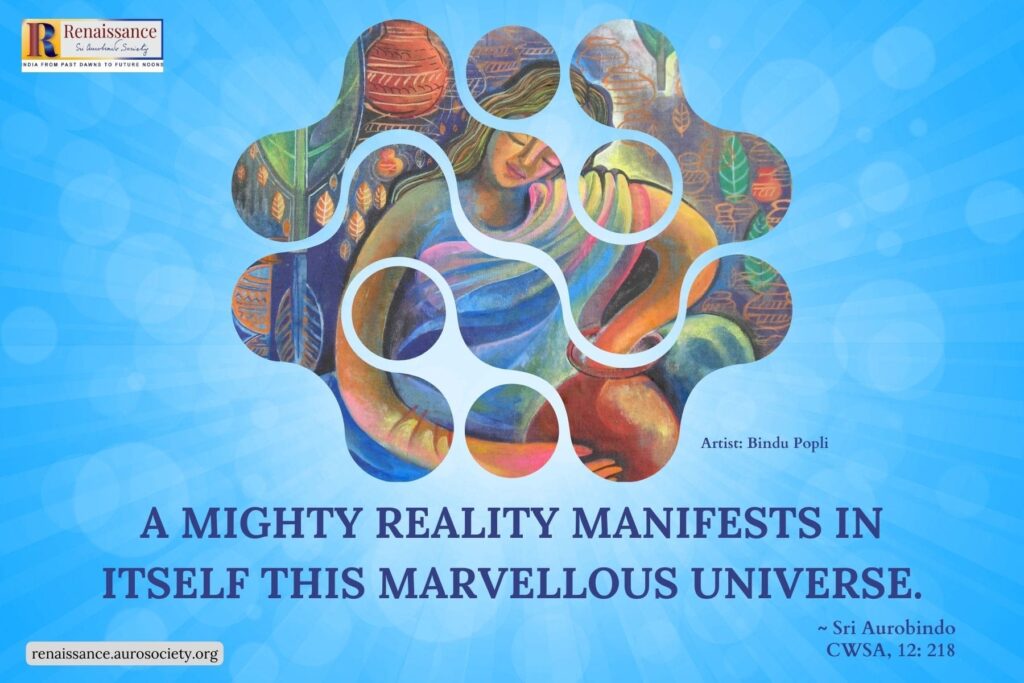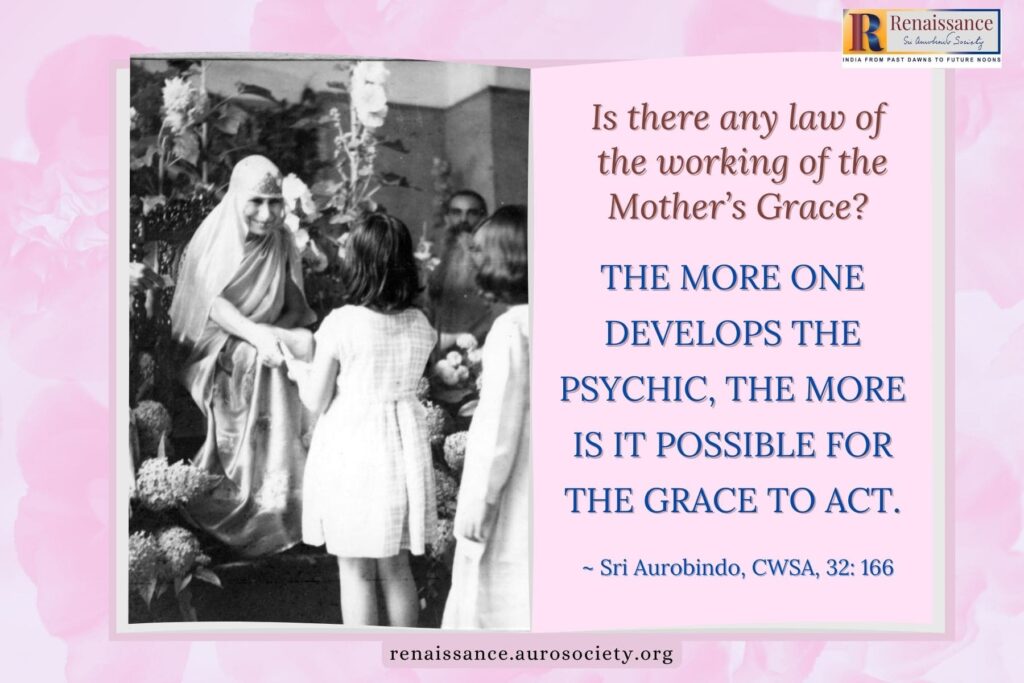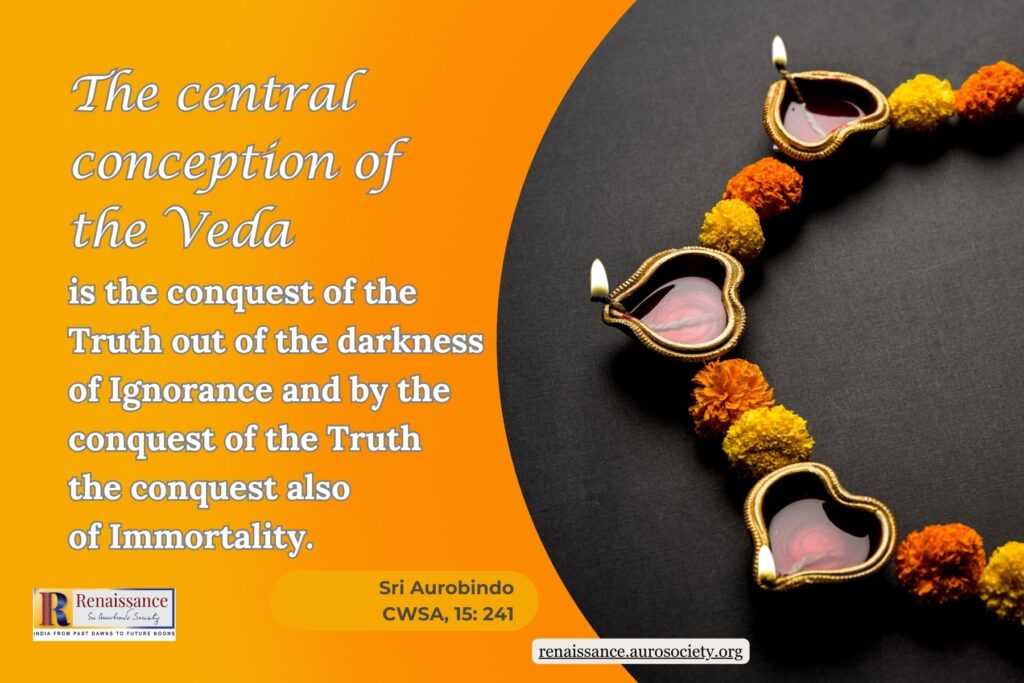Editor’s Note: Sri Aurobindo explains in these passages why a full flowering of Indian civilisation was interrupted, why it is important for India to reassert its peculiar individuality, and why the future demands a true understanding of each civilisation’s unique strengths.

It was the supreme misfortune of India that before she was able to complete the round of her experience and gather up the fruit of her long millenniums of search and travail by commencing a…more perfect age in which moral, intellectual and material development should be all equally harmonised and all spiritualised, the inrush of barbarians broke in finally on her endless solitary tapasya of effort and beat her national life into fragments.
A preparation for such an age may be glimpsed in the new tendencies of spiritual seeking that began with Shankara and continued in later Vaishnavism and Shaivism and in new turns of poetry and art, but it found no opportunity of seizing on the total life of the nation and throwing it into another mould.
The work was interrupted before it had well begun; and India was left with only the remnants of the culture of the material age to piece out her existence.
Yet even the little that was done afterwards, proved to be much; for it saved her from gradually petrifying and perishing as almost all the old civilisations, Assyria, Egypt, Greece, Rome, petrified and perished, as the material civilisation of Europe, unless spiritualised, must before long petrify and perish. That there is still an unexhausted vitality in her, that she yet nourishes the seeds of re-birth and renewal, we owe to Shankara and his successors and the great minds and souls that came after them.
Will she yet arise, new combine her past and continue the great dream where she left it off, shaking off on the one hand the soils and filth that have grown on her in her period of downfall and futile struggle, and re-asserting on the other her peculiar individuality and national type against the callow civilisation of the West with its dogmatic and intolerant knowledge, its still more dogmatic and intolerant ignorance, its deification of selfishness and force, its violence and its ungoverned Titanism?
In doing so lies her one chance of salvation.
(Sri Aurobindo, CWSA, Vol. 1, pp. 166-167)
***
An education at once more subtle and more massive, a greater originality, force and range of intellectual activity, an insatiable thirst for knowledge, the glut of a giant for work and action, mighty qualities of soul, a superhuman courage, self-abnegation and power to embrace and practise almost impossible ideals, these are the virtues and gifts India demands from the greatest among her sons in the future so that they may be sufficient to her work and her destinies.
***

… there must be in any culture aiming at completeness, not only great and noble governing and inspiring ideas, but a harmony of forms and rhythms, a mould into which the ideas and the life can run and settle. Here we must be prepared for a lesser perfection, a greater incompleteness. And the reason is that just as the spirit is vaster than its ideas, the ideas too are larger than their forms, moulds and rhythms.
Form has a certain fixity which limits; no form can exhaust or fully express the potentialities of the idea or force that gave it birth. Neither can any idea, however great, or any limited play of force or form bind the infinite spirit: that is the secret of earth’s need of mutation and progress.
The idea is only a partial expression of the spirit. Even within its own limits, on its own lines it ought always to become more supple, to fill itself out with other views, to rise and broaden to new applications, and often it has to lose itself in uplifting transformations of its own meaning into vaster significances or fuse itself into new and richer syntheses.
In the history of all great cultures therefore we find a passage through three periods, for this passage is a necessary consequence of this truth of things. There is a first period of large and loose formation; there is a second period in which we see a fixing of forms, moulds and rhythms; and there is a closing or a critical period of superannuation, decay and disintegration.
This last stage is the supreme crisis in the life of a civilisation; if it cannot transform itself, it enters into a slow lingering decline or else collapses in a death agony brought about by the rapid impact of stronger and more immediately living though not necessarily greater or truer powers or formations.
But if it is able to shake itself free of limiting forms, to renovate its ideas and to give a new scope to its spirit, if it is willing to understand, master and assimilate novel growths and necessities, then there is a rebirth, a fresh lease of life and expansion, a true renascence.
***
…every civilisation presents a mixed and anomalous appearance and can be turned by a hostile or unsympathetic observation which notes and exaggerates its defects, ignores its true spirit and its qualities, masses the shades, leaves out the lights, into a mass of barbarism, a picture of almost unrelieved gloom and failure, to the legitimate surprise and indignation of those to whom its motives appear to have a great and just value.
For each has achieved something of special value for humanity in the midst of its general work of culture, brought out in a high degree some potentiality of our nature and given a first large standing-ground for its future perfection.
Greece developed to a high degree the intellectual reason and the sense of form and harmonious beauty, Rome founded firmly strength and power and patriotism and law and order, modern Europe has raised to enormous proportions practical reason, science and efficiency and economic capacity, India developed the spiritual mind working on the other powers of man and exceeding them, the intuitive reason, the philosophical harmony of the Dharma informed by the religious spirit, the sense of the eternal and the infinite.
The future has to go on to a greater and more perfect comprehensive development of these things and to evolve fresh powers, but we shall not do this rightly by damning the past or damning other cultures than our own in a spirit of arrogant intolerance. We need not only a spirit of calm criticism, but an eye of sympathetic intuition to extract the good from the past and present effort of humanity and make the most of it for our future progress.
Also read:
Indian Renaissance – the Demand from Us
~ Design: Beloo Mehra



